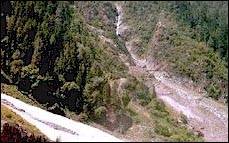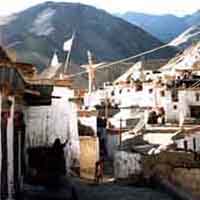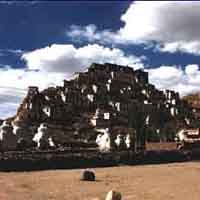|
Travelogues Journey to Ladakh - Part I
|
|||||||||||||||||||||
We had escaped Srinagar and all the half truths, falsehoods and blatant lies. Rumours upon rumours of shootings, killings, villages full of skulking rebels and soldiers at every corner. In the old town it was checkpost central, the guns seemed to follow you from the eyeholes in the towers of sandbags, they stared - we left and cycled hurriedly away. But we'd escaped all that and left behind all the deceiving houseboat owners, the sly shikara men who were born to diddle and marketeer. Taking a bus far out of town we were plodding up into the hills and heading as far as we could until roadblocks, landslides, or soldiers stopped the road. The long road into Ladakh: a high altitude desert Buddhist Kingdom. This therefore made it a pretty irresistible target for travellers and was the reason we had gone to Kashmir in the first place. The gossip in Srinagar had not been clear as to the exact nature of things ahead - but from what I had heard already I would not have been surprised if there were sea serpents on the roadside. |
More on J & K • An Overview • Ladakh
Travelogues | ||||||||||||||||||||
Impossibly slowly we ground our way through the gearbox and upwards from settlement to village, past checkpoints and barracks. On the road, locals were wrapped in brown blankets with colourful edging. No waterproofs, wet locks, hair, forehead. Animals sometimes carried like children, babies hidden in folds. They looked with interest at our vehicle - had it been that long since anything had passed? We stopped often for embarking, getting off, unloading voluminous bundles, masses of unmentionables, anonymous tins and boxes. We were travelling so slowly even by Indian standards. My mind kept ruminated about the prospects of a dry arrival for my rucksack tied tightly to the roof but only under a light blanket. I imagined my tired pack slowly imbibing water over the long day like a sponge. My mind slowly ran over the same circles of thoughts, like the worn grooves of a long-playing record. I was truly hemmed in, bus bound.
The truck people came from all over India, regional moustaches, beards and dress still trying to peep out from blankets and the freezing mask of face-numbing boredom. The odd flash of a bright Sikh turban trying to be heard, from underneath whatever could be requisitioned to protect them from the downpour. The ubiquitous brown blanket, edged with attractive edging, however, was worn by most folk, sometimes with plastic decoration, eg. plastic bag to the head or fertilizer bag tied around waist. Any scrap of waterproof material was mustered for the parade of haute couture in Sonamarg. Some inventive garb was fabulous, homespun, lace-strung, shiny silver angel wings or efficient boot tucking for deluge-proof bottom half. Kashmiri men had small braziers of charcoal embers situated about the stomach, strung from the neck, so they seemed pregnant under their wrapped blankets. They called these their 'wives', not such a great trade off I thought, but then I realized there were no women here, we hadn't seen one since we arrived. This was all adding up to be a splendid little town of delights for my female companion.
A quick stop to the ironmongers tent and I had my own piece of blue plastic sky, cut off a humongous roll. I wondered idly how much he must have had at the start of this season's collection, as nearly everyone was sporting some kind of plastic hat or cape. TF was not as impressed as I was, and although I blended in now with the local residents, with the bonus of partially concealing unwanted tourist status, there was a certain amount of wrapping and noisy crumpling to do before I was ready for the outside world. She politely declined my idea of being the only shrink-wrapped bit of skirt in the place, but I was undaunted. What price was silliness if you could see life through a blue rinse and keep dry? It would make the perfect picnic groundsheet too...
Slowly, imperceptibly, as the rain seeped into us, we slipped into Sonamarg society. The Sikh resto owner, with a faded picture of the Golden Temple to keep him company. His naan boy rebuilt the tandoori oven every day, slapping handfuls of muddy clay around the cracked edges. It resembled a rocket exhaust, and being the warmest thing around for several hundred kilometres, everyone in the eating house was usually facing it. Unsurprisingly, the interior of this particular establishment began to get quite well known. Even drinking tea with corporals and sergeants was a welcome respite.
The huffing and puffing of our Manic and erratic behaviour was only a short space away. My brain refused to take the situation seriously, for fear of actually accepting the ever so slight risk to my person in getting over the pass and heading off into the unknown. Rumours about the blocked 'road' were rife and contradictory; landslides, rockfalls, soldiers helping, soldiers not, lorries going tomorrow, jeeps allowed first etc etc. And the endless negotiations with truck drivers continued. Different operators promised to be in favour with the police and to be first in the queue of vehicles to take us away from here, but every morning it was the same. No news at the police checkpoint, no news from the soldiers. Our ambitious plans of somehow hiring horses and going native over the pass had been abandoned for self-imposed security reasons and cost. My enquiries about the Bi'kon people, who I had been told about in Srinigar, fell on stony ground due to a slight linguistic misunderstanding on my part. I had assumed they were nomads or local peasants, trotting over the snowy wastes with donkeys or horses, but I was dismayed to find that they actually the employees of the road company, BEACON. One afternoon, one of their road clearers swept in, an army of small urchins in the back, an Oliver Twist contingent of road repairers. In Blighty, they wouldn't even have been trusted with a newspaper round. The beautiful mountains lay all around, but sheathed in mist for most of the time. One evening, a miraculous sunset was revealed as we were strolling amongst the green, peering at shrouded valleys with last season's unmelted snow and receding glaciers. The vista was incredible, but spoilt somewhat by the presence of blue shacks or bunkers every half a mile or so, bastions of Indian sentries, splendidly alone in their private bog tents. We trotted out of town, past the sea of trucks and the quack medicine salesman at the roadside, who was displaying a panoply of unknown animal bits and pieces, stones of power and powdered magic. Further on, there were some strange settlements of the Gudja people, nestled in the woods. Only the wood smoke revealed these apparently stone age dwellings, as they had turf rooves and earth covered walls. They were the homes of horse traders, who still practised a semi-nomadic way of life, performing a long journey with their horses into Jammu every year. The children here were mercifully free from begging disorders and there were no requests for pens and rupees. We were most spectacularly ignored and free to watch them running about the hills, shocks of black hair and rags. Shabir's lorry was at the front of the queue, but then it had been there for two entire days. The 'front of the queue' meant a strategic position near the bridge out of Sonamarg, alone and a trifle isolated because no-one could even be bothered to go this far out of town. There was a conspicuous lack of anyone at the number two position as nobody believed anyone was going anywhere. Before the bridge, spanning an icy river, was a wooden check-post with a lazy band of soldiers and associated hangers on. They, the army and the BEACON road repairers held the key to our fate....It was going to be a day of great bribes. Shabir and his entourage had bucket loads of faith - "We leave at 8.00 tomorrow', he'd emphatically declared, discarding all the odds stacked against him. Now it was morning, his cabin crew were busy brewing tea in the cabin, a pink, salty brew adulterated with sodium bicarbonate....I tried not to look too closely. Everyone was running up and down the roof, tightening a rope here and again adjusting the tarpaulin that had been fiddled with for 2 weeks. I had put our rucksacks up top too, but was not trying to get excited as we had done exactly that same operation three times the day before. The truck itself was resplendent, it was the Lion King of the Bedford lorry fleet, bejewelled, adorned, trinketed and spick and span - it had received rare moments of loving attention and rest. As I looked it over I felt for the first time a feeling of faith in an Asian vehicle. By Jove we were going to get out of here and in style too. We had 'Love for Sale - 99% Discount' painted on the back of our trusty motor, clouds were moving, it wasn't raining, there were holes in the familiar overcast blanket and all was right with the world. Well, with the male contingent anyway - TF wasn't so sure, the intentions of Shabir and his merry band had the potential of being far from honourable. Knowing an overnight stop was very likely, this was an unease lurking at the back of both our minds, but not acknowledged.
|
|||||||||||||||||||||
Editor: Romola Butalia (c) India Travelogue. All rights reserved. |
|||||||||||||||||||||

 Finally we reached our destination, at an undefined time in the grey afternoon and at an equally obscure location. Dazed, looking down the road, I looked into a set from a spaghetti western, without the sunshine, horses and saloons, but a frontier, nonetheless. We had arrived in the wild west, no doubt about it, a one-street temporary encampment called Sonamarg. Just one way up and one way down, flanked by a handful of wooden and tin shacks that inspired no hope of a warm tourist welcome. Sonamarg already had its hands full with around 300 or so truck drivers, cabin boys and associated hangers-on that were stuck there. This Bethlehem-type scenario was compounded by the temporary occupation of extra Indian troops, there to safeguard the coming elections. The truckers, draped in plastic sheeting or wrapped in blankets, walked up and down the main drag between the lorry park and the one eating house. They were bored, really bored, two weeks of utter tedium simply displayed across their faces. We were only tourists who had endured a 'bad' day on a bus, these guys had been making tea, playing cards and smoking bidis for millennia.
Finally we reached our destination, at an undefined time in the grey afternoon and at an equally obscure location. Dazed, looking down the road, I looked into a set from a spaghetti western, without the sunshine, horses and saloons, but a frontier, nonetheless. We had arrived in the wild west, no doubt about it, a one-street temporary encampment called Sonamarg. Just one way up and one way down, flanked by a handful of wooden and tin shacks that inspired no hope of a warm tourist welcome. Sonamarg already had its hands full with around 300 or so truck drivers, cabin boys and associated hangers-on that were stuck there. This Bethlehem-type scenario was compounded by the temporary occupation of extra Indian troops, there to safeguard the coming elections. The truckers, draped in plastic sheeting or wrapped in blankets, walked up and down the main drag between the lorry park and the one eating house. They were bored, really bored, two weeks of utter tedium simply displayed across their faces. We were only tourists who had endured a 'bad' day on a bus, these guys had been making tea, playing cards and smoking bidis for millennia.
 Representing a pair of lambs to slaughter on the altar of a touting dream, we now had to find accommodation. An early attempt by a 'I am hooping to learn English only' young tout had already been despatched by TF on the promise of 'small room, no bed'. I gave him top marks for irrepressibly smiling throughout, however, and just hoped we wouldn't be doing a humiliating climb down come sunset. He was still grinning like an idiot (maybe he is deranged?) as we checked out the Official Government Tourist Bungalow. Not normally ones to peruse such establishments, we crossed the lawn with some trepidation. Tourist Bungalows are some sort of (usually) plush houses for officials or dignitaries who get stuck in out of the way places. As they are always nearly empty however, they are quite often open to negotiation on a good tourist rate, usually providing some kind of slave-wallah into the bargain, if you like that sort of thing.
Representing a pair of lambs to slaughter on the altar of a touting dream, we now had to find accommodation. An early attempt by a 'I am hooping to learn English only' young tout had already been despatched by TF on the promise of 'small room, no bed'. I gave him top marks for irrepressibly smiling throughout, however, and just hoped we wouldn't be doing a humiliating climb down come sunset. He was still grinning like an idiot (maybe he is deranged?) as we checked out the Official Government Tourist Bungalow. Not normally ones to peruse such establishments, we crossed the lawn with some trepidation. Tourist Bungalows are some sort of (usually) plush houses for officials or dignitaries who get stuck in out of the way places. As they are always nearly empty however, they are quite often open to negotiation on a good tourist rate, usually providing some kind of slave-wallah into the bargain, if you like that sort of thing.
 neighbouring soldiery every morning was the best piece of entertainment in the entire district, rivalled only by the Tourist Bungalow proprietor, who insisted on keeping the front lawn pristine. Protected only by a sickly string of barbed wire, cows and goats were constantly getting in to the verdant pasture and the mad patron skipped about with a shovel, manically scooping up turds and throwing them over the fence. Sat, huddled on the damp concrete and watching him scurry to and fro, it was plain to see he had obviously lost the plot months ago. This was not an easy option to ignore. The insiduous process that had started in Srinagar, when the rain had commenced in earnest, was fast turning from frustration into an outright excuse for behaving like a looper. With books read, mandalas painted and journals up to date, we were slowly succumbing to the local malady of boredom and terrible tedium.
neighbouring soldiery every morning was the best piece of entertainment in the entire district, rivalled only by the Tourist Bungalow proprietor, who insisted on keeping the front lawn pristine. Protected only by a sickly string of barbed wire, cows and goats were constantly getting in to the verdant pasture and the mad patron skipped about with a shovel, manically scooping up turds and throwing them over the fence. Sat, huddled on the damp concrete and watching him scurry to and fro, it was plain to see he had obviously lost the plot months ago. This was not an easy option to ignore. The insiduous process that had started in Srinagar, when the rain had commenced in earnest, was fast turning from frustration into an outright excuse for behaving like a looper. With books read, mandalas painted and journals up to date, we were slowly succumbing to the local malady of boredom and terrible tedium.